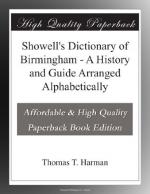Hill, Rowland.—The originator of the present postal system, born at Kidderminster, December 3, 1795, coming to Birmingham with his parents when about seven years old. His father opened a school at the corner of Gough Street and Blucher Street, which was afterwards (in 1819) removed to the Hagley Road, where, as “Hazlewood School” it became more than locally famous. In 1825 it was again removed, and further off, this time being taken to Bruce Castle, Tottenham, where the family yet resides. Rowland and his brother, Matthew Davenport Hill, afterwards Recorder of Birmingham, who took part in the management of the school, went with it, and personally Rowland Hill’s connection with our town may be said to have ceased. Early in 1837 Mr. Hill published his proposed plans of Post Office reform, but which for a long time met with no favour from either of the great political parties, or in official quarters, where, it has been said, he was snubbed as a would-be interloper, and cursed as “a fellow from Birmingham coming to teach people their business”—
“All office doors were closed against
him—hard
All office heads were closed against him
too,
‘He had but worked, like others,
for reward,’
‘The thing was all a dream.’
‘It would not do.’”
In 1839, more than 2,000 petitions were presented to Parliament in favour of Mr. Hill’s plans, and eventually they were adopted and became law by the 3rd and 4th Vict., cap. 96. The new postage law by which the uniform rate of fourpence per letter was tried as an experiment, came into operation on the 5th of December, 1839, and on the 10th January, 1840, the reduced uniform rate of 1d. per letter of half-an-ounce weight was commenced. Under the new system the privilege of franking letters enjoyed by members of Parliament was abolished, facilities of prepayment were afforded by the introduction of postage stamps, double postage was levied on letters not prepaid, and arrangements were made for the registration of letters. Mr. Hill received an appointment in the Treasury, but in 1841, he was told his services were no longer required. This flagrant injustice caused great indignation, and a national testimonial of L15,000 was presented to him June 17, 1846. On a change of Government Mr. Hill was appointed Secretary to the Postmaster General, and, in 1854, Secretary to the Post Office, a position which he retained until failing health caused him to resign in March, 1864, the Treasury awarding him for life his salary of L2,000 per year. In the same year he received a Parliamentary




